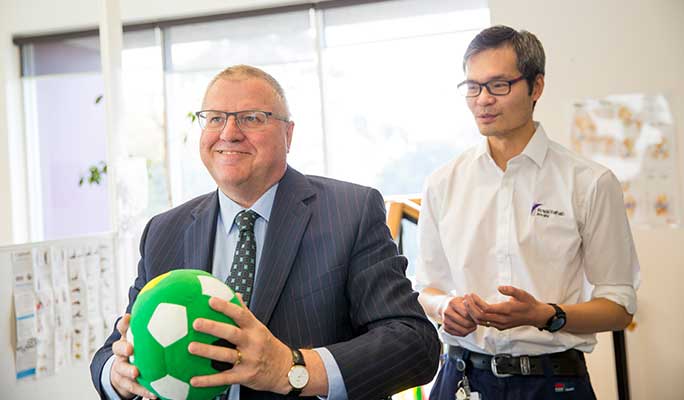Darrel, 63, has run an accounting firm in Sydney’s CBD for 20 years. In early 2019, his doctor noticed some shaking in his left hand. Further testing revealed he had Parkinson’s disease.
Darrel was quickly referred by his neurologist to Dr Anuka Parapuram and accepted into Royal Rehab Private Hospital’s Day Rehabilitation Program. Here he was offered a variety of therapies from the PD Warrior program, an internationally recognised program for sufferers of Parkinson’s disease.
“When Darrel came to us, his main symptom was the tremor in his hand,” says Royal Rehab Exercise Physiologist, Luke Maddalena. “He also had slightly decreased coordination and motor planning ability, and had started to experience some changes in his speech – his voice was quieter, and he would sometimes cough when eating and drinking.”
Based on his symptoms, it was decided that Darrel would participate in three different types of therapy – speech therapy, physiotherapy and exercise physiology – for six weeks, several times per week.
The PD Warrior program is specifically designed to help manage the symptoms and slow the progression of Parkinson’s disease. The program harnesses the relationship between the brain and exercise; that is, through exercise, the brain can re-wire itself to work in different ways by forming new neural connections.
“Patients need to perform the exercises with a high level of effort, as this is one of the most important factors that drive the neuroplastic changes,” says Luke. “The exercises also have to be very specific to be effective. So to treat Darrel’s hand tremor, we worked on forcing Darrel to use his hand in certain ways – gripping things, opening his hand and spreading his fingers far apart, throwing and catching and practising certain arm movements.”

Darrel also undertook speech therapy, which involved practising certain sounds, sustaining volume and manipulating pitch. “I have to be able to speak clearly and concisely at work and since the therapy at Royal Rehab, I now have much more control over the way I speak,” Darrel says.
“The staff at Royal Rehab gave me a set of tools I can use on a daily basis to improve my functioning across all areas. I can usually notice an improvement within 24 hours of doing the exercises – sometimes, it’s straight away. The therapy has also given me a confidence in my movements that I had lost.
“The therapists were really lovely – I actually looked forward to going to Royal Rehab! They gave me a sense of security as I would talk with them about how the disease was affecting me personally, and it was much less severe than what I had read about online. My lifestyle is essentially the same as before my diagnosis and I am hopeful the therapy will help to defer some of the more life-changing symptoms of Parkinson’s.”

